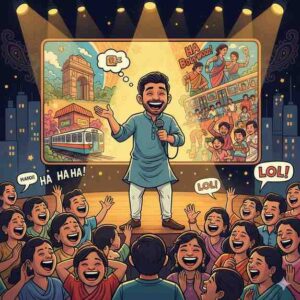In India, where family is not just an institution but the cornerstone of social identity, family traditions profoundly shape beliefs and values. These traditions extend beyond rituals, serving as the foundation for cultural continuity and influencing individual perspectives and societal norms.
The Impact of Family Traditions on Individual Identity
Family traditions in India encompass a wide range of practices, from daily rituals to annual celebrations such as Diwali, Eid, or Christmas. These activities foster a strong sense of identity and belonging while embedding religious, ethical, and social values from an early age. A 2023 survey by the Pew Research Center found that86% of Indiansbelieve family traditions play a “very important” role in their lives, compared to a global average of 62%. This indicates the unique weight Indian families place on cultural practices in shaping personal and societal values.
Joint family meals, for instance, are a longstanding tradition in Indian households, especially in rural and semi-urban settings. These meals are not merely about sustenance; they serve as informal spaces for intergenerational bonding, moral discussions, and the reinforcement of familial unity. A report by IndiaSpend (2022) highlighted that72% of Indian families still partake in at least one daily meal together, a practice that contributes to stronger familial bonds and emotional well-being.
Family Traditions and Social Cohesion
In a country as diverse as India, family traditions play a pivotal role in promoting social cohesion and cultural literacy. By participating in the traditions of multiple religions and ethnic groups within extended families and communities, individuals develop a nuanced understanding of India’s pluralistic society. This fosters tolerance and mutual respect, critical in a nation with22 official languages and over 2,000 distinct ethnic groups.
Data from the Lok Foundation (2021) reveals that84% of Indian households celebrate festivals that transcend their own religious or cultural boundaries, reflecting the integration of traditions into broader social frameworks. Such practices enhance social harmony and contribute to India’s unique capacity for cultural coexistence.
Challenges and Evolution of Family Traditions
While family traditions reinforce values, they can also perpetuate outdated social norms. For example, the tradition of arranged marriages—followed by93% of Indian families, according to a 2022 Statista report—has faced criticism for occasionally prioritizing caste and financial status over individual choice. Similarly, practices like dowry, although outlawed, persist in some communities, reflecting the tension between tradition and modern ethical standards.
At the same time, younger generations are redefining these traditions. A YouGov poll (2023) found that67% of urban Indian millennials and Gen Z membersare open to modifying traditional practices to align with contemporary values, such as gender equality and individual autonomy. This highlights a generational shift aimed at preserving the essence of traditions while shedding regressive elements.
Conclusion
Family traditions are central to shaping beliefs and identities in Indian society. They provide a moral and cultural compass while fostering social cohesion in an increasingly globalized world. However, their relevance lies in their ability to adapt to evolving ethical landscapes. As India modernizes, the reinterpretation of family traditions—grounded in respect for heritage yet aligned with progressive values—will determine their enduring role in shaping beliefs and societal norms. With92% of Indiansexpressing pride in their cultural heritage (Gallup, 2023), the balance between preserving traditions and embracing change is crucial for a harmonious future.










